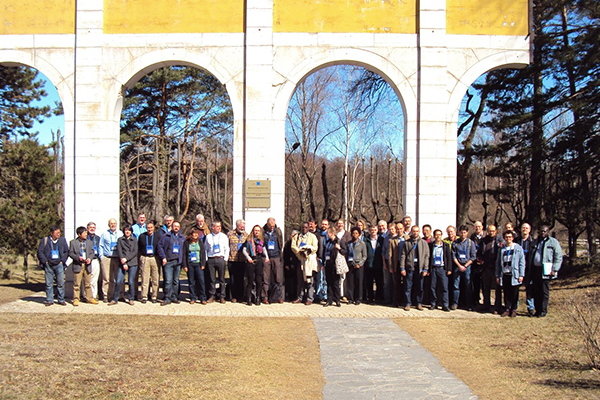
International Year of Soils
UD's Vargas part of United Nations publication on benefits of soil carbon
2:04 p.m., Jan. 20, 2015--The University of Delaware’s Rodrigo Vargas is part of an international team of researchers who have identified advances on the benefits of soil carbon in an effort to address serious environmental challenges affecting millions of people around the globe.
Their findings were released on World Soil Day last month in Volume 71 of the United Nations’ Scientific Committee for Problems of the Environment (SCOPE) series titled “Soil Carbon: Science, Management and Policy for Multiple Benefits,” which was published by the intergovernmental scientific research organization CABI.
Research Stories
Chronic wounds
Prof. Heck's legacy
Dec. 5, 2014, was the first official World Soils Day designated by the U.N. General Assembly. The day was established to connect people with soils and demonstrate the critical importance of soils to everyday life.
It also served to announce 2015 as the International Year of Soils.
Vargas, assistant professor in the Department of Plant and Soil Sciences in UD’s College of Agriculture and Natural Resources, worked with a group of researchers coordinated by Steven Banwart of the University of Sheffield’s Department of Civil and Structural Engineering, Elke Noellemeyer of the National University of La Pampa Argentina and Eleanor Milne of Colorado State University and the University of Leicester, all of whom served as editors on the publication.
Vargas said the group met at the Joint Research Centre in Ispra, Italy, to discuss the benefits of soil carbon. The main goal of the volume was to summarize the importance of soils and the importance of the benefits of soil carbon, ranging from social and economic to biogeochemical benefits.
Vargas said he hopes the publication and the International Year of Soils will bring more awareness to the importance of soils and the problems that arise from soil degradation.
“Soils are a resource that we take for granted and that resource is being degraded and, unfortunately, is not being treated with the respect or the seriousness it deserves,” said Vargas. “Soil degradation is a serious problem. Soils are not only alive because of the biodiversity they hold or the biogeochemical reactions they have, but also they are beautiful entities.”
Vargas said the problem with soil degradation is that it is not as easily observed as an issue such as deforestation, where it is easy to see where trees have been wiped away. But while not as obvious to the naked eye, soil degradation is just as serious of a problem, he said.
“The degradation is less evident unless the problem gets so big that you have massive soil erosion. Then it becomes an evident problem that everyone can see,” he said. “The contamination of soils -- for example, heavy metals in soils, excess nutrients in soils, over fertilization of soils -- is linked to degradation and that is something that we wanted to highlight during World Soils Day and through 2015 as the International Year of Soils.”
The publication is divided into seven parts, with Vargas contributing to the second chapter of the first part titled “Soil Carbon: A Critical Natural Resource — Wide-Scale Goals, Urgent Actions.”
Vargas said the primary goal of the section is to show how soil carbon is a critical resource and an important soil conservation issue by highlighting how organic carbon intersects with five important topics: food security, energy security, climate security, water security and biodiversity security.
“These topics are directly linked with soil carbon but also they are linked among each other, so this chapter tries to highlight the interactions and the importance of the soil with current environmental security issues,” said Vargas.
The chapter also considers food production and long-term goals and short-term actions, highlighting how a key issue is that it takes a long time to increase soil carbon.
“Soil carbon is not going to increase in a matter of weeks or only within a year. It’s a process that will take time,” Vargas said. “Long-term goals for managing soil carbon are vital, but we also have to take short-term actions so that we have the ability to achieve the long-term goals. If we just delay everything, it’s hard to do that.”
Vargas noted that there are challenges on both the research and the implementation sides of the problem, especially with regard to how people interact with soils. “We need to create social consciousness about the value of soils so people will start taking more interest and responsibility in preserving and managing that resource,” said Vargas.
Vargas co-wrote the chapter along with Generose Nziguheba of the International Institute of Tropical Agriculture in Nairobi, Kenya; Andre Bationo of the Alliance for a Green Revolution in Africa (AGRA); Helaina Black of the James Hutton Institute in the United Kingdom; Daniel E. Buschiazzo of the National Institute for Agronomic Research of Argentina (INTA) and National University of La Pampa, Argentina; Delphine de Brogniez of the European Commission Directorate General Joint Research Centre, Italy; Hans Joosten of the Institute of Botany and Landscape Ecology, Ernst Moritz Arndt University of Greifswald, Germany; Jerry Melillo of the Ecosystems Center, Marine Biological Laboratory, in Woods Hole, Massachusetts; Dan Richter, also of the Ecosystems Center; and Mette Termansen of the Department of Environmental Science, Aarhus University, Denmark.
This research builds on ongoing efforts by Vargas to improve the understanding of ecosystem carbon dynamics across North America sponsored by the National Aeronautics and Space Administration (NASA) and the U.S. Department of Agriculture (USDA).
Article by Adam Thomas








